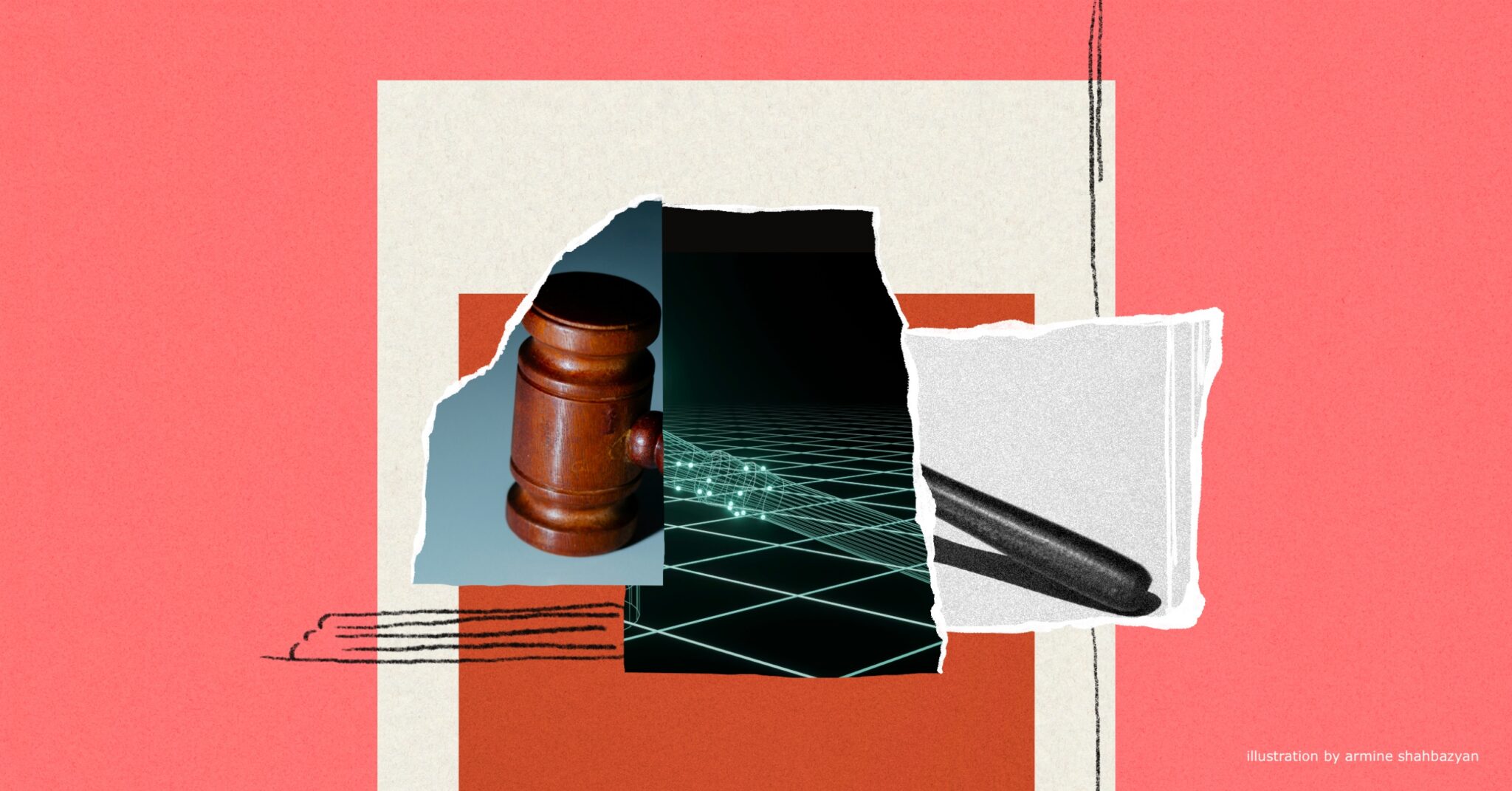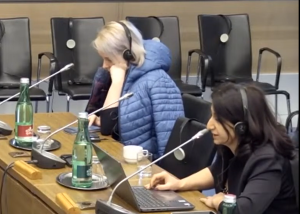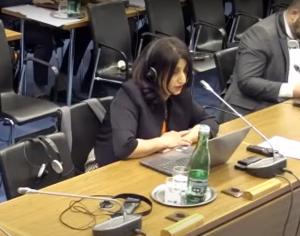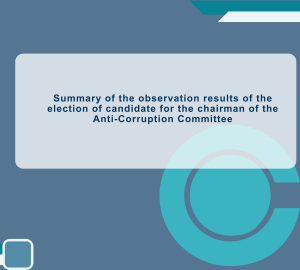

Supplementary Human Dimension Meeting/Day 2
The speech by PRWB legal expert Anna Melikyan at the

While backlogged courts and overloaded judges remains a pressing issue in Armenia, there are ongoing discussions regarding the necessity of appointing new judges despite concerns about the limited appeal of the role.
Rafik Grigoryan, a lawyer and former Deputy Minister of Justice, says, “When I was ⟮working⟯ at the Ministry of Justice in 2019, there were vacancies for both civil and criminal judges and there were very few people who wanted to apply.”
For example, in 2021, only three candidates applied for 11 vacant criminal judge positions.
“This clearly indicates an institutional problem. If there are no people who want to become judges, it will be difficult to fill these positions with qualified personnel,” says Grigoryan.
The goal of filling vacant positions is to ensure the continuity of judicial reforms, defined by the Strategy of Judicial Reforms for 2022-2026 and the subsequent plan of action adopted by the Government on July 21, 2022.
Ten measures are aimed at sustaining the progress of judicial reforms, with the majority already executed. While legislative adjustments have been enacted in certain instances, they await legal enforcement. Only three measures are left to be completed by 2026.
The New Special Procedure for Becoming a Judge
Until 2023, the procedure for becoming a judge in Armenia included a general qualification check. This required the candidate to pass a written exam, undergo psychological testing, and complete an interview. Subsequently, the candidate would study at the Academy of Justice for up to eight months. Only after completing these studies, would the candidate be considered for appointment.
For more than a year now, a special procedure has been implemented alongside the general one. In this instance, the candidate takes a written exam and undergoes an interview. If successful, they are immediately added to the list of judge candidates without the need to study at the Academy of Justice.
The rationale behind this change is to increase the appeal of the judicial system as a profession and expand the pool of professionals.
A new article — Article 110.1 — was introduced to the Law on Amendments and Additions to the Judicial Code, establishing a special procedure. Parliament adopted this law on December 23, 2022, and it came into effect on January 7, 2023.
Mariana Danielyan, head of the Legal Acts Development and Examination Department of the Supreme Judicial Council (SJC), stated that while the special procedure doesn’t require attending the Academy of Justice, “the requirements have been somewhat tightened.” The written exam is more difficult, ensuring that the successful candidate possesses the necessary knowledge, skills and experience.
Moreover, Article 110.1 ensures the “substantial complexity” of the qualification check in case of a special procedure.
Danielyan notes that it was challenging to fill the vacant positions through the general procedure. Some candidates failed to pass the qualification check, and those who did had to study at the Justice Academy for up to eight months. As a result, hiring a new judge took approximately a year and the positions remained vacant.
For instance, there were 34 vacant positions in the judicial system in April 2023. A year later, according to the SJC website, only three remain. In December of the previous year, Karen Andreasyan, the SJC President, announced that the judiciary is almost fully staffed. Dozens of specialists across all specializations had been selected, trained, and were awaiting appointment.
Furthermore, the SJC stated in this announcement that the introduction of a special procedure also combats corruption risks. “Leaving judge positions vacant for such a long time could enable each new judiciary leadership to fill them at its discretion and based on personal interests,” says Danielyan.
Serious Risks in the New System
While SJC representatives present the new system and its results in as positive a light as possible, the expert report from the Protection of Rights Without Borders NGO highlights several serious problems.
Araks Melkonyan, the report’s co-author and president of the NGO, points out that the special procedure for qualification verification was introduced without public discussion.
In fact, as early as September 2022, a bill proposing amendments to the Judicial Code was presented for public discussion on the unified website for publishing legal acts, e-draft.am. This bill did not mention a special procedure. This version was approved by the government and sent to the National Assembly. On the same day as the first reading in parliament, a new article defining the special procedure was added at the suggestion of a ruling party MP, leading to the adoption of the law’s new version.
Another issue relates to candidates who are not studying at the Justice Academy.
“Even if I am a competent lawyer, I cannot become a professional judge without academic training. In the Academy, one gains not only theoretical knowledge but also practical skills, such as communication skills, courtroom management, and the capacity to issue legal rulings,” says Melkonyan. She also notes that they didn’t have a practical opportunity to assess the complexity of the exam, as the Department of Justice denied them a copy of an already completed exam, even without any personal data or other restricted information.
Mariana Danielyan, head of the Department of Development and Examination of Legal Acts of the SJC, says that completed exams are not confidential and there is no rule forbidding them from being shared with others.
It’s also worth noting, as per the report, that no changes or higher standards were planned for the professional qualifications of judge candidates during the special procedure qualification check. The standards remain the same for both the general and special procedure. Other problems were also identified during the written exam and interview.
The Newly Appointed Judges Through the Special Procedure
“The special-procedure tool was introduced and quickly implemented. Up until September 2023, two general procedures and seven special procedures were conducted; 28 people passed the qualification check through the special procedure and 24 of them were already appointed as judges by the end of the year,” says Melkonyan.
Among those who passed the special procedure and were appointed as judges, some have certain political influence. For instance, the SJC website reveals that Judge Gagik Harutyunyan was an advisor to Karen Andreasyan during his tenure as Minister of Justice and SJC President. Andreasyan terminated his membership in the ruling Civil Contract party two weeks before becoming a member of the SJC.
According to the SJC website, Davit Sargsyan, former Deputy Governor of Vayots Dzor region, was appointed as a judge in September 2023. He is the brother of Trdat Sargsyan, a member of Civil Contract, former Governor of Vayots Dzor, and currently an MP.
Gurgen Malkhasyan was appointed as a judge in September last year. His biography on the SJC website reveals that he was the deputy director of the Malkhasyants Advocacy Center LLC until 2023. An investigation by Info.com found that this firm’s employees had donated 7.2 million drams to the Civil Contract election campaign in the summer of 2023. Minas Malkhasyan (shareholder and director), Nazik Malkhasyan (deputy director), and Grigor Malkhasyan, who are judge Gurgen Malkhasyan’ children, were among these employees.
In Judge Masis Melkonyan’s case, Armenia’s president refused to sign the decree appointing him as a judge, raising objections to his candidacy with the SJC. Although the SJC did not accept the objections, the president did not sign the decree. It was implemented by force of law. If the president does not sign the decree within three days and does not submit it to the Constitutional Court, the decree is considered to have taken effect. Furthermore, Masis Melkonyan ran in the 2021 extraordinary parliamentary elections on the electoral list of the Republic Party. He was a member of the party’s political council and the Constitutional Reforms Council representing the same party.
“Such examples raise serious concerns about the quality of justice. While they may be excellent specialists and pass numerous fair judicial acts, we cannot predict the impact and consequences of their affiliations with certain forces in some cases,” says Melkonyan.
Periodic Review of Judges’ Conduct
The creation of structures for the periodic evaluation of judges’ conduct aims to prevent corruption within the system and enhance trust in the judiciary.
As a rationale for this measure, it notes that currently, only the conduct of newly appointed and promoted judges is reviewed. Later, only their property status is checked. There is no provision for examining conflicts of interest or other problematic issues.
The Ministry of Justice reported that in December 2023, the National Assembly approved a legislative package in its first reading. This package aims to assess the conduct of newly appointed judges, those subject to promotion, and existing judges. It includes proposed amendments and additions to the Judicial Code, the Law “On the Prevention of Corruption Commission” and other laws.
The proposed amendments to the Judicial Code will enable the Corruption Prevention Commission (CPC) to evaluate judges’ conduct. They will examine factors such as property status, involvement in court cases as plaintiffs or defendants, past criminal, administrative and disciplinary liabilities, associations with criminal networks, conflicts of interest, and compatibility with their position.
However, the president has yet to sign this legislative package, and it currently lacks legal force. Araks Melkonyan notes that the implementation of this conduct-checking mechanism is significantly delayed, and its practical application remains uncertain.
For example, the Central Committee of Justice currently provides non-binding, advisory conclusions on the conduct of judge candidates or those up for promotion. These conclusions can be negative, positive, or neutral. Yet, there have been cases where people with negative conduct assessments were appointed as judges. Protection of Rights Without Borders reported that three people appointed as judges by the SJC through the same special procedure had received negative conduct evaluations.
“Perhaps, the SJC has dispelled its doubts, but it offers no explanation to the public when a person with a negative conduct evaluation is appointed or promoted as a judge. The principle should be that individuals with a negative conduct evaluation should not be approved. It’s crucial, of course, that the conclusion of the CPC is adequately substantiated,” says Melkonyan.
Increase in Judges’ Salaries
One way to ensure the continuation of judicial reforms is to increase salaries for judges. Mariana Danielyan notes that while the base salaries have not changed, amendments to the law “On the remuneration of individuals holding public positions and public service positions” have led to increases in the allowances and bonuses that judges receive.
Specifically, according to Article 13 of the law, a judge of the Court of First Instance receives a supplement of 60% of the official rate. An Appellate Court judge receives 55%, and judges of the Court of Cassation receive 50%.
According to Article 12, the president, vice-president, and judge of the Constitutional Court receive a bonus of 80% of the official rate.
Meanwhile, the Judiciary Reform Strategy specifies salary increases only for judges of higher courts, with 283 million AMD allocated from the state budget. However, there was a proposal from civil society organizations to prioritize Court of First Instance judges due to their heavy workload.
Other Steps to Ensure Continuity of Reforms
Several other actions were taken to ensure the continuity of judicial reforms:
Mariana Danielyan notes that these provisions will only take effect once the SJC’s decision on the Appeal Commission’s composition also comes into effect. “Currently, the SJC decision is still being processed,” she says.
This law stipulates that each complaint will be examined by a four-member SJC panel, with different members for each case. This committee will review the complaint within a month and may choose to eliminate the disciplinary penalty, impose a different disciplinary penalty, or leave the SJC Board’s decision unchanged. The Board’s decision following the complaint review is final and cannot be appealed.
A legislative package has been developed which, once adopted, will increase the number of non-judge members in the Committee on Ethics and Disciplinary Matters of the General Assembly of Judges by three, making a total of five. Araks Melkonyan points out that currently, two members represent the civil society, and they cannot influence the commission’s decisions. Therefore, it is critical to include a sufficient number of non-judge members in the commission, nominated by non-governmental organizations.
Former Deputy Minister of Justice Rafik Grigoryan states that the representation of civil society members aims to ensure the commission’s transparency and accountability, which is achieved with the current system.
Several other activities are planned for implementation by 2026. Among these is the provision of building and logistical resources for anti-corruption courts. According to Artur Asatryan, head of procurement at the SJC, current repairs are underway in almost all administrative buildings this year, following directives from the president of the Central Bank of Armenia. About 77 million AMD has been allocated for these tasks.
There are also plans to develop a concept for specialized courts and sub-specializations of judges, alongside legislative solutions for their establishment — for example, judges handling small claims, certain types of administrative cases, military tribunals, and so on.
While the majority of the activities aimed at continuing legal reforms are considered complete, they are not yet fully operational, making it premature to evaluate the results.

The speech by PRWB legal expert Anna Melikyan at the

The speech by PRWB legal expert Anna Melikyan at the

On January 20, 2025, the interview stage of the competition

On behalf of the undersigned civil society organizations, we welcome